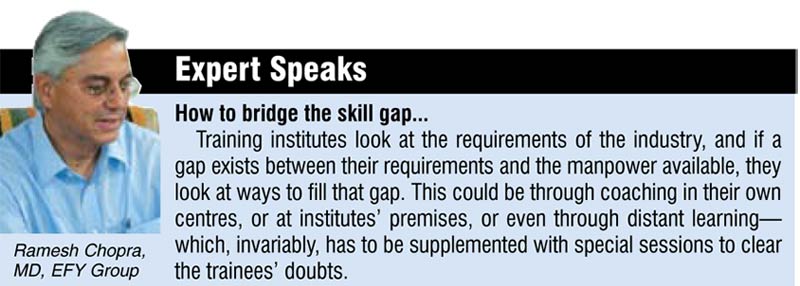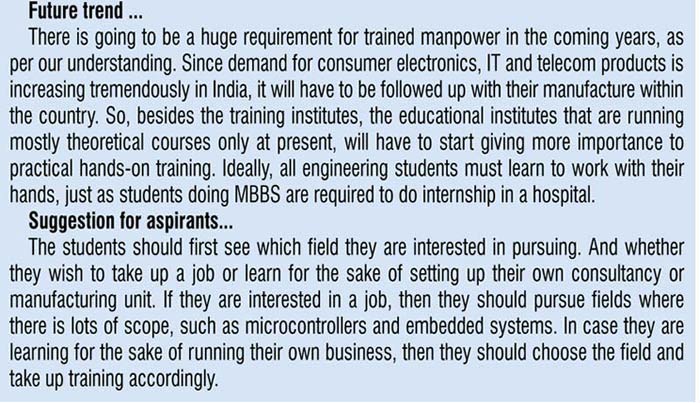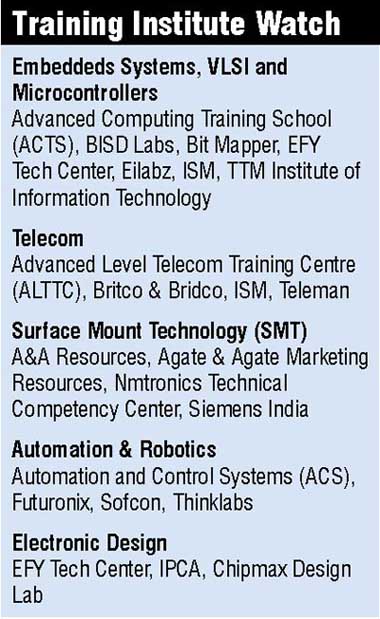Anup Agarwal (name changed) is 26 and works with one of the leading electronics companies in Bangalore. I met him at electronicIndia 2008, efficiently handling the stall of his company. He was not one of the few lucky ones who cleared the campus interviews from his engineering college. But he managed to get a good job after six months of specialised training in VLSI. Agarwal attributes this to a reputed training institute where he had enrolled himself.
Among India’s electronics professionals, Agarwal is not alone in honing his skills with the help of a training institute. Most of the industry veterans agree that there is a need to bridge the gap between the quality of knowledge imparted by the engineering colleges and the industry requirements. Training Institutes try to fill this skill gap.
“Curriculum development is a slow process compared to the pace at which the industry advances. A suitable training institute may be a good alternative to bridge the skill gap,” opines Sanjeev



Jain, director, TNS Network Solution. Training institutes offer various types of specialised vocational courses in VLSI, microcontrollers and embedded systems, electronics design, automation, surface-mount technology (SMT), telecom, and hardware maintenance and repair These courses are designed keeping in mind the skill requirements of the industry. They prepare engineers to handle projects independently, providing employers the opportunity to induct
[stextbox id=”info”]
Curriculum development is a slow process compared to the pace at which the industry advances. A suitable training institute may be a good alternative to bridge the skill gap
advances. A suitable training institute may be a good alternative to bridge the skill gap
—Sanjeev Jain, director, TNS Network Solution
[/stextbox]
new staff in a project with minimum domain-specific training. Says Loganathan V., vice president, ISM, a Bangalore-based reputed training Institute, “We provide finishing touch to engineers on their practical skills.”
[stextbox id=”info”]
For optimising telecom applications, even professionals with science and engineering background often require specialised training
background often require specialised training
—K.S. Mittal, director-project, Mobile Communication (India)
[/stextbox]
Focus areas for training
During the past three months amid this recession, whenever I found a ray of hope in the Indian electronics industry it invariably had to do something with the word ‘telecom.’ If there is one sectorwhich is showing tremendous growth, and will continue to expand, it is telecom. This is clearly corroborated by the fact that India is currently adding 8-10 million mobile subscribers every month. Given the huge size of the nation and the fact that only 25 per cent of the population has communication network now, the future looks bright.
“Considering that telecom is a booming sector even in times like the current economic recession, the demand for employable individuals is quite high. And in this regard, the types of firms that engage in recruiting are spread across operators, integrators and vendors,” reveals Pius Maria Prasad, director-human resource, Huawei Technologies India. This huge manpower need can be addressed only by an extensive training network throughout the country.
“For optimising telecom applications, even professionals with science and engineering background often require specialised training in theory and practice in order to properly handle different types of machines and instruments in various systems of telecom equipment, both in wired and wireless communication,” says, K.S. Mittal, director-projects, Mobile Communication (India).
The niche skill sets required are 3G and other advanced mobile technologies, mobile repairing techniques and networking.
[stextbox id=”info”]
We do see a gap in such areas as VLSI design and embedded systems software
—C.P. Ravikumar, director-university relation,
Texas Instruments
[/stextbox]Another sector that is likely to benefit from the current recession is automation. As corporate majors look to cut costs and increase productivity, one way they are likely to achieve this is through the increased use of technology, and the only way to achieve that is through automation. In this age of cutthroat competition, flexibility and efficiency are the keys to quickly develop and produce an increasing number of products to meet the rapidly changing demands of the market.
“Since the automation sector comprises fairly large and mature companies with highly technical processes, this reflects on the manpower needs as well,” says Vishal Dahiya, factory automation, Panasonic India. Complex industrial automation control systems are already installed or being installed across industries.
 There is a need to understand and acquire knowledge of these systems to keep the productivity and profitability high, reduce downtime of machines and troubleshoot the systems faster. So practical, industry-focused training on various industrial automation systems like programmable logic controllers (PLCs), SCADA, HMI, drives, PLC networking, process instrumentation and panel designing can be of huge value.
There is a need to understand and acquire knowledge of these systems to keep the productivity and profitability high, reduce downtime of machines and troubleshoot the systems faster. So practical, industry-focused training on various industrial automation systems like programmable logic controllers (PLCs), SCADA, HMI, drives, PLC networking, process instrumentation and panel designing can be of huge value.
The semiconductor industry—driven by the networking (wireless, broadband), optoelectronics and personal computing requirements—has also showed a whopping growth in recent times. Candidates joining this industry would be expected to have technical skills in the areas of embedded systems, microcontrollers, VLSI, designing and sometimes in the niche areas like digital signal processing (DSP).







